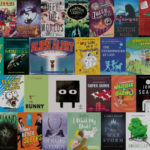by Katy Larson, Classroom Specialist at Mackin
Think back to your childhood home. Were there books lining your shelves and bedside tables, or were there few if any books around the home? At the time, you may not have realized how important the number of books in your home library was. When, in fact, the number of books that are in the home has a direct impact on literacy and education.
According to one study, “being raised in a bookless home compared to being raised in a home with a 500-book library has as great an effect on the level of education a child will attain as having parents who are barely literate (3 years of education) compared to having parents who have a university education (15 or 16 years of education).” 1Growing up in a home with a library of any size has a positive, lasting effect on an individual’s educational career. Regardless of the parents’ level of education, growing up with a home library improves skills in adult literacy, numeracy and technological problem solving.2What this all boils down to is a career in education that lasts 3.2 years longer.3
Now, a 500-book library can seem extreme for any home library; however, starting small can have an enormous impact on literacy. For example, a home library of even 20 books can help create a culture of reading and learning in the home. Looking at the data, having 80 books in the home can help students reach an average level of literacy. This level continues to increase with the more books that are in the home, but levels off at around 350 books.4
A home library can also help curb the summer slide, which in turn can narrow the disparities between low- and high-income households. Having books in the home can help support each student, especially if the student is from a low-income family. A staggering 51% of public school students come from poor families; therefore, bringing books into the home can help families who are unable to help support learning outside of the school day.5The summer
Let Mackin help build home libraries and curb the summer slide with our take-home reading backpacks. Our backpacks can include up to five curated titles, or you can design a custom take-home reading project with the help of our experts. These reading bags can be an important start to a student’s home library collection, or a continuation to their current home library. In addition to the books, the backpacks include reading guides in English and Spanish, so reading can become a part of the family routine, and develop a lasting culture of reading in the home.
References
1University of Nevada, Reno. (2010, May 21). Books in home as important as parents’ education in determining children’s education level. ScienceDaily. Retrieved January 3, 2019 from www.sciencedaily.com/releases/2010/05/100520213116.htm
2 Sikora, J., Evans, M., & Kelley, J. (2018). Scholarly Culture: How Books in Adolescence Enhance Adult Literacy, Numeracy and Technology Skills in 31 Societies. Social Science Research 77(2019) 1-15. Retrieved from https://doi.org/10.1016/j.ssresearch.2018.10.003
3University of Nevada, Reno. (2010, May 21). Books in home as important as parents’ education in determining children’s education level. ScienceDaily.
4Katz, B. (2018). Growing Up Surrounded by Books Could Have Powerful, Lasting Effect on the Mind. Retrieved from https://www.smithsonianmag.com/smart-news/growing-surrounded-books-may-bolster-skills-later-life-180970523/
5McGill-Franzen, A., Ward, N., & Cahill, M. (2016). Summers: Some Are Reading, Some Are Not! It Matters. The Reading Teacher 69(6) 585-596. DOI:10.1002/trtr.1461
6McGill-Franzen, A., Ward, N., & Cahill, M. (2016). Summers: Some Are Reading, Some Are Not! It Matters.
7Mraz, M., & Rasinski, T. (2007). Summer Reading Loss. The Reading Teacher 60(8) 784-789. DOI:10.1598/RT.60.8.9






